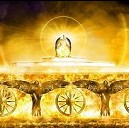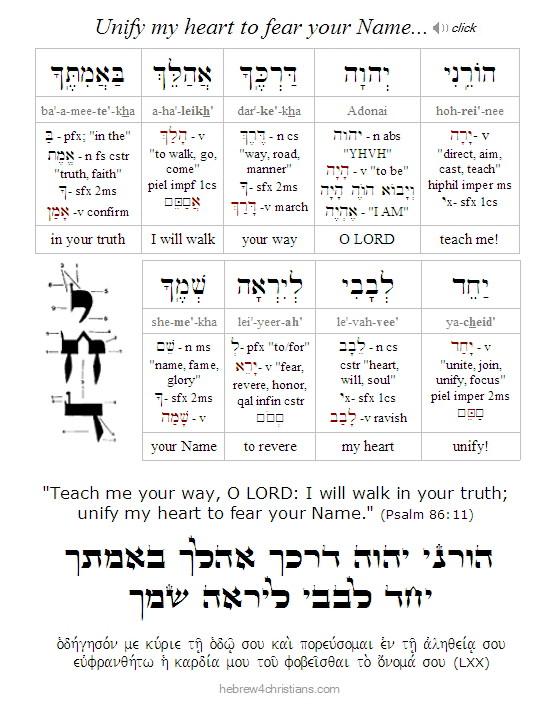|
WHAT DOES IT MEAN TO "FEAR" THE LORD? Does it mean that we should be afraid of God's disapproval of us? Should we live in dread over the prospect of future judgment for our sins? In order to consider some of these questions, let's consider a verse from this week's Torah portion:
וְעַתָּה יִשְׂרָאֵל מָה יְהוָה אֱלהֶיךָ שֹׁאֵל
מֵעִמָּךְ כִּי אִם־לְיִרְאָה את־יְהוָה אֱלהֶיךָ
לֶָלֶכֶת בְּכָל־דְּרָכָיו וּלְאַהֲבָה אתוֹ וְלַעֲבד
אֶת־יְהוָה אֱלהֶיךָ בְּכָל־לְבָבְךָ וּבְכָל־נַפְשֶׁךָ
לִשְׁמֹר אֶת־מִצְוֹת יְהוָה וְאֶת־חֻקּתָיו
אֲשֶׁר אָנכִי מְצַוְּךָ הַיּוֹם לְטוֹב לָךְ
ve·a·tah · Yees·ra·el · mah · Adonai · E·lo·hey'·kha · sho·el
me·ee·makh · kee · eem-le·yeer·ah · et-Adonai · E·lo·hey'·kha
la·le'·khet · be·khol-de·ra·khav · oo·le·a·ha·vah · o·to · ve·la·a·vod
et-Adonai · E·lo·hey'·kha · be·khol-le·vav·kha · oo·ve·khol-naf·she'·kha
leesh·mor · et-meetz·vot · Adonai · ve'et-chook·ko·tav
a·sher · a·no·khee · me·tza'·ve·kha · hai·yom · le·tov · lakh

"And now, Israel, what does the LORD your God require of you, but to fear
the LORD your God, to walk in all his ways, to love him, to serve
the LORD your God with all your heart and with all your soul,
and to keep the commandments and statutes of the LORD,
which I am commanding you today for your good?" (Deut. 10:12-13)
In this summary statement of what the LORD requires of us, the fear of the LORD (i.e., yirat HaShem: יִרְאַת יהוה) is mentioned first. First we must learn to properly fear the LORD and only then will we be able to walk (לָלֶכֶת) in His ways, to love (לְאַהֲבָה) Him, and to serve (לַעֲבד) Him with all our heart and soul. Again, the requirement to fear the LORD your God (לְיִרְאָה אֶת־יהוה) is placed first in this list...
Indeed, "the fear of the LORD is said to be the beginning of wisdom (רֵאשִׁית חָכְמָה)." Without fear of the LORD, you will walk in darkness and be unable to turn away from evil (Psalm 111:10; Prov. 1:7; 9:10; 10:27; 14:27, 15:33; 16:6). The Scriptures plainly declare that "the fear of the LORD leads to life" (יִרְאַת יְהוָה לְחַיִּים, lit. "is for life"):
יִרְאַת יְהוָה לְחַיִּים
וְשָׂבֵעַ יָלִין בַּל־יִפָּקֶד רָע
yee·rat · Adonai · le·cha·yeem
ve·sa·vei'·a · ya·leen · bal-yee·pa·ked · ra'

"Fearing the LORD leads to life, the one who does
so rests satisfied and will not be visited with harm." (Prov. 19:23)
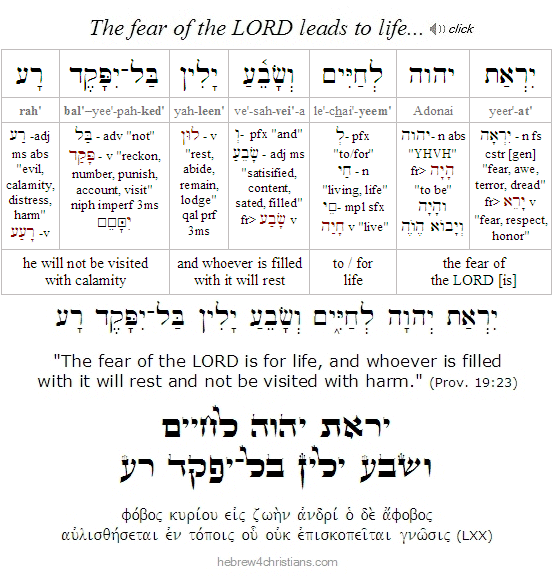
The word translated "fear" in many versions of the Bible comes from the Hebrew word yirah (יִרְאָה), which has a range of meaning in the Scriptures. Sometimes it refers to the fear we feel in anticipation of some danger or pain, but it can also can mean "awe" or "reverence." In this latter sense, yirah includes the idea of wonder, amazement, mystery, astonishment, gratitude, admiration, and even worship (like the feeling you get when gazing from the edge of the Grand Canyon). The "fear of the LORD" therefore includes an overwhelming sense of the glory, worth, and beauty of the One True God.

Some of the sages link the word yirah (יִרְאָה) with the word for seeing (רָאָה). When we really see life as it is, we will be filled with wonder and awe over the glory of it all. Every bush will be aflame with the Presence of God and the ground we walk upon shall suddenly be perceived as holy (Exod. 3:2-5). Nothing will seem small, trivial, or insignificant. In this sense, "fear and trembling" (φόβοv καὶ τρόμοv) before the LORD is a description of the inner awareness of the sanctity of life itself (Psalm 2:11, Phil. 2:12).
Abraham Heschel wrote, "Awe is an intuition for the dignity of all things, a realization that things not only are what they are but also stand, however remotely, for something supreme. Awe is a sense for transcendence, for the mystery beyond all things. It enables us to perceive in the world intimations of the divine, to sense the ultimate in the common and the simple: to feel in the rush of the passing the stillness of the eternal. What we cannot comprehend by analysis, we become aware of in awe" (Heschel: God in Search of Man). He continued by quoting, "The awe of God is the beginning of wisdom" (Psalm 111:10) and noted that such awe is not the goal of wisdom (like some state of nirvana), but rather its means. We start with awe and that leads us to wisdom. For the Christian, this wisdom ultimately is revealed in the love of God as demonstrated in the sacrificial death of His Son. The awesome love of God for us is the end or goal of Torah. We were both created and redeemed in order to know, love, and worship God forever.
According to the classical sages, there are three "levels" or types of yirat HaShem, or the fear of the LORD. The first level is the fear of unpleasant consequences or punishment (i.e., yirat ha'onesh: יִרְאַת הָענֶשׁ). This is perhaps how we normally think of the word "fear." We anticipate pain of some kind and want to flee from it. But note that such fear can also come from what you believe others might think about you. People will often do things (or not do them) in order to barter acceptance within a group (or to avoid rejection). Social norms are followed in order to avoid being ostracized or rejected. One implication of this type of fear is that "people will value justice not as a good but because they are too weak to do injustice with impunity" (Plato: Republic). As a thought experiment, would you act differently if you were given a magical ring that could make you invisible? Would the "freedom to do whatever you like with impunity" lead you to consider doing things you otherwise wouldn't do? If so, then you might be acting under the influence of this kind of fear....
The second type of fear concerns anxiety over breaking God's law (sometimes called yirat ha-malkhut: יִרְאַת הַמַּלְכוּת). This kind of fear motivates people to do good deeds because they are afraid God will punish them in this life (or in the world to come). This is the foundational concept of karma (i.e., the cycle of moral cause and effect). As such, this kind of fear is founded on self-preservation, though in some cases the heart's motive may be mixed with a genuine desire to honor God or to avoid God's righteous wrath for sin (Exod. 1:12, Lev. 19:14; Matt. 10:28; Luke 12:5). In the commandment not to curse the deaf or place a stumblingblock before the blind, for example, the Torah adds, "you shall fear the Lord your God" (Lev. 19:14). God does not wink at evil or injustice, and those who practice wickedness have a genuine reason to be afraid (Matt. 5:29-30; 18:8-9; Gal. 6:7-8). God is our Judge and every deed we have done will be made known: "Every man's work shall be made manifest: for the day shall declare it, because it shall be revealed by fire; and the fire shall try every man's work of what sort it is" (1 Cor. 3:13). "For we must all appear before the judgment throne of Messiah (כִסֵּא־דִין הַמָּשִׁיחַ) so that each one may receive what is due for what he has done in the body, whether good or evil" (2 Cor. 5:10). When we rightly consider God as the Judge of the Universe (שופט העולם), we experience the sentiment that "it is a fearful thing to fall into the hands of the living God" (Heb. 10:31).
The third (and highest) kind of fear is a profound reverence for life that comes from rightly seeing. This level discerns the Presence of God in all things and is sometimes called yirat ha-rommemnut (יִרְאַת הָרוֹמְמוּת), or the "Awe of the Exalted." Through it we behold God's glory and majesty in all things. "Fearing" (יִרְאָה) and "seeing" (רָאָה) are linked and united. We are elevated to the level of reverent awareness, holy affection, and genuine communion with God's Holy Spirit. The love for good creates a spiritual antipathy toward evil, and conversely, hatred of evil is a way of fearing God (Prov. 8:13). "For everyone who does wicked things hates the light and does not come to the light, lest his works should be exposed. But whoever does what is true comes to the light, so that it may be clearly seen that his works have been carried out in God" (John 3:20-21). In relation to both good and evil, then, love (אַהֲבָה) draws us near, while fear (יִרְאָה) holds us back.
Back to our original verse. What does the word yirah mean in Deut. 10:12? Are we to regard it as fear or as awe? Should we fear God in the sense of being threatened by Him for our sins and wrongdoing, or are we are to regard Him in awe, reverence, and majesty? This question is vital, since how we answer it will affect how we are to walk (לָלֶכֶת) in God's ways, how we are to love (לְאַהֲבָה) Him, and how we are to serve (לַעֲבד) the LORD with all our heart and soul (Deut. 10:12).
Both Jewish and Christian traditions have tended to regard yirah to mean fear of God's retribution for our sins. "For we know him who said, 'Vengeance is mine; I will repay.' And again, 'The Lord will judge his people' (Heb. 10:30). God is the Judge of the Universe, and people will be recompensed according to their deeds, whether good or bad. Our lives should be governed by the rewards and punishments that await us in the world to come. We should tremble before the LORD because we are entirely accountable for our lives. We should fear sin within our hearts. Our actions matter, and we should dread the thought of angering God. There will be a final day of reckoning for us all...
- "For we must all appear before the judgment throne of Messiah (כִסֵּא־דִין הַמָּשִׁיחַ), so that each one may receive what is due for what he has done in the body, whether good or evil. Therefore, knowing the fear of the Lord, we persuade others" (2 Cor. 5:10-11).
- "Now if anyone builds on the foundation with gold, silver, precious stones, wood, hay, straw -- each one's work will become manifest, for the Day will disclose it, because it will be revealed by fire, and the fire will test what sort of work each one has done. If what someone has built survives, he will receive a reward. If any man's work is burned up, he shall suffer loss; but he himself shall be saved yet so as through fire" (2 Cor. 3:12-15).
- "If you call on him as Father who judges impartially according to each one's deeds, conduct yourselves with fear throughout the time of your exile" (1 Pet. 1:17).
The Chofetz Chaim warns that even though the fear of God's punishment may deter us from sin in the short run, by itself it is insufficient for spiritual life, since it is based on an incomplete idea about God. It sees God in terms of the attributes of justice (אלהִים) but overlooks God as the Compassionate Savior of life (יהוה). After all, if you are avoiding sin only because you fear God's punishment, you may clean the "outside of the cup" while the inside is still full of corruption... Or you might attempt to find rationalizations to excuse yourself from "legal liability." You may appear outwardly religious (i.e., "obedient," "Torah observant," "righteous"), but inwardly you may be in a state of alienation and rebellion. "The heart is deceitful above all things..." (Jer. 17:9).
Yeshua taught that we need a spiritual rebirth in order to see the Kingdom of God (John 3:3). This is the new principle of life from God (i.e., chayim chadashim: חַיִּים חֲדָשִׁים) that operates according to the "law of the Spirit of life" (Rom. 7:23, 8:2). God loves His children with "an everlasting love" (i.e., ahavat olam: אַהֲבַת עוֹלָם) and draws us to Himself in chesed (חֶסֶד, i.e., His faithful love and kindness). As it is written: אַהֲבַת עוֹלָם אֲהַבְתִּיךְ עַל־כֵּן מְשַׁכְתִּיךְ חָסֶד / "I love you with an everlasting love; therefore in chesed I draw you to me" (Jer. 31:3). Note that the word translated "I draw you" comes from the Hebrew word mashakh (מָשַׁךְ), meaning to "seize" or "drag away" (the ancient Greek translation used the verb helko (ἕλκω) to express the same idea). As Yeshua said, "No one is able to come to me unless he is "dragged away" (ἑλκύσῃ, same word) by the Father" (John 6:44). God's chesed seizes us, takes us captive, and leads us to the Savior... Spiritual rebirth is a divine act of creation, "not of blood nor of the will of the flesh nor of the will of man, but of God" (John 1:13). God is always preeminent.
Those who understand the mission of Yeshua understand yirah in the highest sense of reverence and awe. Only at the Cross may it be said: חֶסֶד־וֶאֱמֶת נִפְגָּשׁוּ צֶדֶק וְשָׁלוֹם נָשָׁקוּ - "love and truth have met, righteousness and peace have kissed" (Psalm 85:10). For at the Cross of Yeshua we see both God's fearful wrath for sin as well as God's awesome love for us. "Therefore, since we are receiving a kingdom that cannot be shaken, let us be thankful, and so worship God acceptably with reverence and awe (μετὰ αἰδοῦς καὶ εὐλαβείας) - for our God is a consuming fire" (Heb. 12:28-29).
חֶסֶד־וֶאֱמֶת נִפְגָּשׁוּ
צֶדֶק וְשָׁלוֹם נָשָׁקוּ
che'·sed · ve·e·met · neef·ga'·shoo
tze'·dek · ve·sha·lom · na·sha'·koo

"Love and truth have met;
righteousness and peace have kissed."
(Psalm 85:10)

Download Study Card
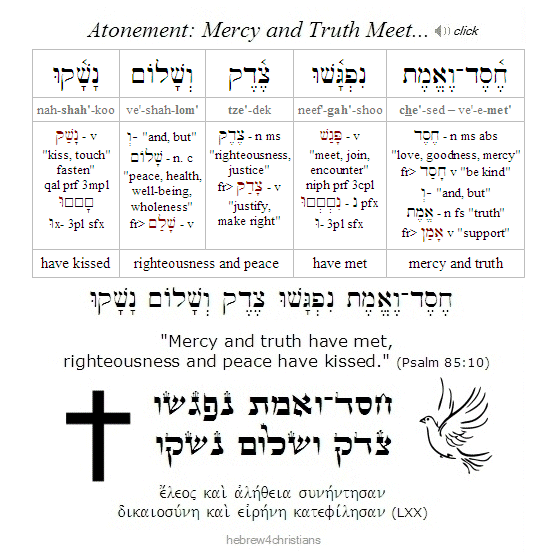
Rabbi Hanina wrote: "Everything is in the hand of heaven except the awe of heaven, as it says, 'And now, Israel, what does the Eternal your God require of you? Only to be in awe of the Eternal your God" (Berachot 33b). It is a struggle to see and think clearly. Many of us have become so dulled and jaded by our worldly concerns that we can barely open our eyes to behold the glories all around us. We walk around half asleep, yawning our way through the cosmic glory that surrounds us.
We must cultivate awe in our hearts by consciously remembering the LORD's Presence and salvation. As King David said:
שִׁוִּיתִי יְהוָה לְנֶגְדִּי תָמִיד
כִּי מִימִינִי בַּל־אֶמּוֹט
shee·vee'·tee · Adonai · le·neg·dee · ta·meed
kee · mee·mee·nee · bal · em·moht

"I have set the LORD always before me; because he is at my right hand,
I shall not be shaken." (Psalm 16:8)

Download Study Card
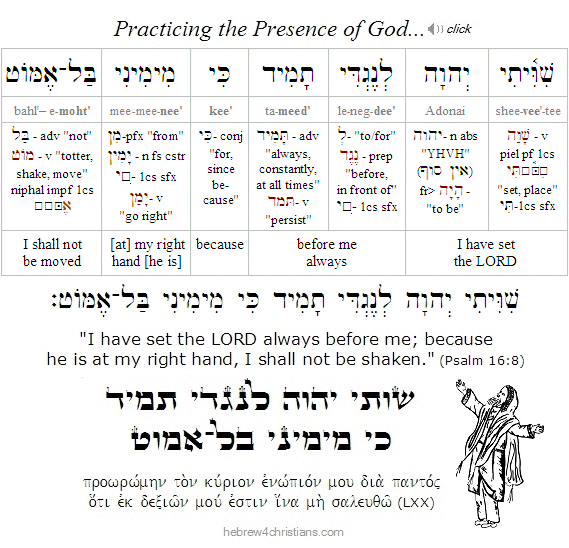
Some of the sages interpret this verse to mean that we should picture the Shekhinah Presence in front of us at all times. In Jewish tradition, a type of meditative artwork called "shivitis" have been designed to remind us that we are standing in the Presence of God. Often these are placed on the eastern wall of a synagogue. Shivitis are artistic renderings of the statement, "Know before whom you stand" (in Hebrew: דַּע לִפְנֵי מִי אַתָּה עוֹמֵד - da lifnei mi attah omed). Sometimes shivitis are also performed orally, as the repetition of a particular verse of Scripture. These techniques are meant to instill within us the sense that God's glory fills the whole earth and that we owe our lives to Him. Since each person is created b'tzelem Elohim (in the image of God), Martin Buber regards each person that stands before us as a "shiviti" - a reminder of God's presence.
Note the paradoxes involved in this verse. We set the LORD always before us (shiviti Adonai lenegdi tamid) so that we will not be shaken, and yet we are to revere the LORD with fear and trembling (Psalm 2:11, Phil. 2:12). Likewise, we draw near to the LORD God as the Righteous Judge - in fear and trepidation - yet in the full confidence of His love as demonstrated by the Cross of Yeshua. God is a Consuming Fire, but also our Comforter.
In the Talmud it is written, "As to the one who reveres God, the whole world was created for that person's sake. That person is equal in worth to the whole world" (Berachot 6b). This might be hyperbole, but it reminds me of the Chassidic tale that says says that every person should walk through life with two notes, one in each pocket. On one note should be the words bishvili nivra ha'olam (בִּשְׁבִילִי נִבְרָא הָעוֹלָם) -- "For my sake was this world created," and on the other note the words, anokhi afar ve'efer (אָנכִי עָפָר וָאֵפֶר) -- "I am but dust and ashes."
Similarly, it is evident that both senses of yirah are called for within our hearts. We must fear the LORD as our Judge and yet be in awe of the cost of His Redemption. We draw close to God while regarding Him with exalted reverence. We should constantly fear sin. We should be afraid of stumbling and dishonoring God with our lives. We should be vigilant, alert, awake, mindful, and attentive to the Presence of the LORD in all things. Sin "misses the mark" regarding our high calling and status as God's children.
 |
"Know before whom you stand" - da lifnei mi attah omed. A reverent and focused attitude means "practicing the Presence of God" in our daily lives. The whole earth is filled with His glory, if we have the eye of faith to see (Isa. 6:3). We are surrounded by God's loving Presence and nothing can separate us from His love (Rom. 8:38-39). In Him we "live and move and have our being" (Acts 17:28). God will never leave us nor forsake us (Heb. 13:5). He has said, "Do not fear, for I am with you; do not be dismayed, for I am your God. I will strengthen you and help you; I will uphold you with my righteous right hand" (Isa. 41:10).
When we identify with the substitutionary death of Yeshua as our Sin-Bearer before the Father, we accept God's righteous verdict for our sin. My sin put Yeshua on the cross. My sin caused Him to bleed, to suffer, and to die... Yeshua took my place on the cross so that I would not have to endure the penalty warranted for my crimes. This is a fearful thing, connected with the punishment for sin, and therefore answers to the heart's fear of God as the Righteous Judge (yirat ha-malkhut: יִרְאַת הַמַּלְכוּת). The fearful consequences of sin comes first, since it is only by means of the sacrificial death of Yeshua that we may hope for forgiveness...
The good news is that the sacrifice of Yeshua reconciles us to God by exchanging God's judgment for your sin with the righteousness of Messiah. Indeed, the Greek word translated "reconciliation" is katallage (καταλλαγή), which means to exchange one thing for another (Rom. 5:10; 1 Cor. 7:11; 2 Cor. 5:18, 20, Col. 1:21, etc.). This "exchange" is imputed to you solely through faith in the merit of Yeshua as your Sin-Bearer before the Father. Yeshua "entered once for all into the holy places, not by means of the blood of goats and calves but by means of his own blood, thereby securing an eternal redemption (αἰωνίαν λύτρωσιν for גְּאוּלַּת עוֹלָם). This was part of God's eternal plan to redeem the world from the curse of sin (Eph. 1:4; Heb. 9:12; John 17:24; Col. 1:22; Heb. 9;26, 10:10; 1 Pet. 1:20; Rev. 13:8). Therefore "there is no fear in love, but perfect love casts out fear, because fear is connected to punishment (κόλασις / הָענֶשׁ), and and whoever fears in this way has not been perfected in love" (1 John 4:18). The judgment against your sin was made at the Cross and you are now declared righteous by faith (2 Cor. 5:21, Col. 1:22). God regards you in light of the sacrifice of His Son, and the payment for your sins has been fully made (Rom. 5:6-10; 1 Pet. 2:24; 3:18; Col. 1:20-22; 1 Tim. 2:6; Gal. 3:13; Heb. 9:12). If you are genuinely trusting in God's salvation, the fear of punishment for your sins effectively comes to an end...
But the good news gets even better. The "divine exchange" of our sin for Yeshua's righteousness also means that we exchange our natural life with the life represented by Yeshua's resurrection... Yeshua came to destroy the one who has the power of death (the devil) and "to deliver those who through fear of death are subject to lifelong slavery" (Heb. 2:14-15). The resurrection demonstrates that God is LORD over the law's judgment of sin (and therefore the "authority of death"). Yeshua's death as our Sin-bearer before the Law's verdict was answered by the power of the resurrection (Col. 2:13-14). "The sting of death is sin, and the power of sin is the law" (1 Cor. 15:56). Once Yeshua made satisfaction for sin through obedience to the Law, He rendered death powerless. God's love overcomes the law's verdict (and God's wrath) by bearing it on our behalf. Yeshua's victory over the law is the victory of God's ransoming love. The resurrection ensures that the sacrifice made by God to God was one where love and justice kiss (Psalm 85:10). We are now free to serve God according to the "law of the Spirit of Life" (תוֹרַת רוּחַ הַחַיִּים) -- apart from the "law of sin and death" (תּוֹרַת הַחֵטְא וְהַמָּוֶת) -- by means of the resurrection power of God's life within our hearts (Rom. 8:2). We are now free to come boldly before the "Throne of Grace" to find mercy and grace to help in time of need (Heb. 4:16).
If anyone is "in the Messiah" he is briah chadashah (בְּרִיאָה חֲדָשָׁה), a "new creation." The old has passed away, behold - all things are made new (2 Cor. 5:17). The very power that raised Yeshua from the dead now dwells in you (Rom. 8:11). The miracle of new life is "Messiah in you - the hope of glory" (Col. 1:27). Ultimately the goal of salvation was not simply to save us from the power of sin and death, but to unite us with God in eternal love. You were redeemed to be a true child of God, no longer a slave to fear of death...
It is the combination of fear and love that leads us to the place of genuine awe. At the Cross we see God's passionate hatred for sin as well as God's awesome love for sinners. The resurrection of Yeshua represents God's vindicating love. We stand in awe of God because of His love and His righteousness. He is both "just" and the "justifier" of those who are trusting in His salvation (Rom. 3:21-26).
We usually make a distinction between "faith" and "fear," but this distinction needs to be somewhat qualified. Sometimes fear implies the absence of faith, and we are commanded to banish such from our hearts: "Al Tirah: Fear not, for I am with you" (Isa. 41:10). But when we approach God, we should be in fear (yirah), showing reverence and humility. Our faith in God's love should never remove awe and reverence from our hearts. On the contrary, true faith is intimately connected with the vision of God's majesty and glory, and that glory is most clearly seen in the sacrificial death and resurrection of His Son....
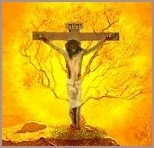
May you fall before the cross in fear of your sins, but may you be raised up by the power of God's salvation... May you then walk in awe of God's ways, "to love him, to serve the LORD your God with all your heart and with all your soul." Amen.
|


